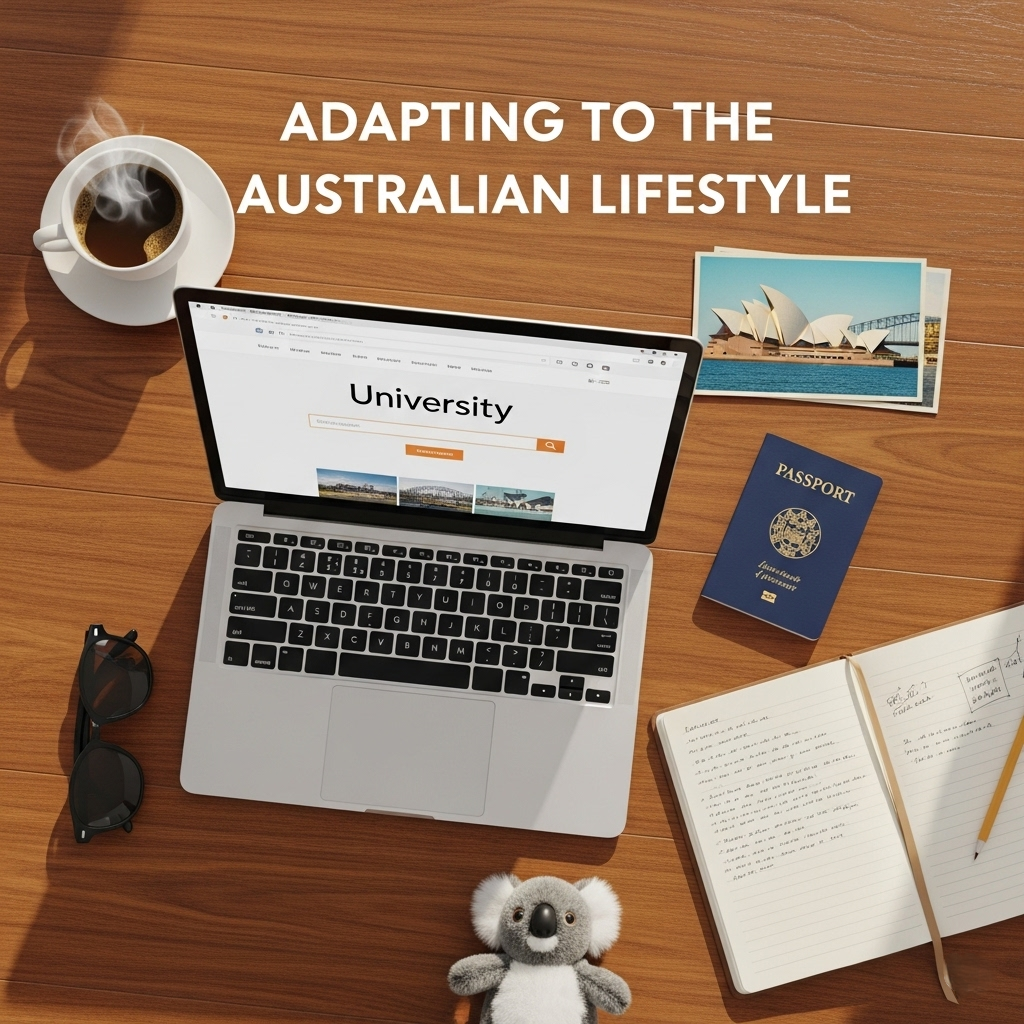Australia, with its world-class universities and vibrant cities, is an increasingly popular destination for Indian students seeking to broaden their academic horizons. But moving halfway across the world isn’t just about attending lectures and acing exams.
It’s about immersing yourself in a new culture, adapting to a different lifestyle, and making a home away from home. Navigating these changes can be an exciting but also potentially challenging experience. This post by IMFS explores how Indian students in Australian culture can successfully adjust, thrive, and make the most of their time Down Under.
Adapting to a new country involves more than just knowing the language; it’s about understanding social norms, navigating daily life, and connecting with both the local community and the existing Indian diaspora. By understanding key aspects of Australian culture and taking proactive steps to integrate, Indian students can transform their study abroad experience into a truly enriching and unforgettable chapter.
How do Indian students adapt to the Australian lifestyle?

Adjusting to the Australian lifestyle requires understanding several key areas. Here’s a breakdown to help you settle in:
Accommodation: Finding Your Feet
Finding the right place to live is crucial for feeling comfortable and secure in a new environment. Australia offers various accommodation options for students, ranging from on-campus residences to shared houses and private apartments. On-campus residences often provide a convenient and social environment, especially for first-year students. However, they can be more expensive than other options.
Shared houses, where students rent a room in a house with other tenants, are a popular and cost-effective choice. This allows you to meet new people and share expenses. Private apartments offer more independence but come with higher costs and responsibilities. When searching for accommodation, consider factors such as location (proximity to university and public transport), cost, amenities (internet access, laundry facilities), and the terms of the lease agreement. Thorough research and careful consideration will ensure you find a suitable and comfortable place to call home.
Food: Navigating the Australian Culinary Scene
Food is a fundamental part of culture, and adjusting to a new cuisine can be both exciting and challenging. Australian cuisine is diverse and influenced by various cultures, including British, European, and Asian. While you might miss the familiar flavors of home, exploring Australian cuisine is a great way to immerse yourself in the local culture.
Major cities in Australia have a growing number of Indian restaurants and grocery stores, making it easier to find familiar ingredients and dishes. Shopping at local markets and grocery stores can also be a cost-effective way to manage food expenses. Don’t be afraid to try new things! From Vegemite (a savory spread) to barbecued snags (sausages), experiencing the local flavors is part of the adventure. Learning to cook some simple Australian dishes can also be a fun way to connect with the local culture. Think about mastering a basic barbecue or learning to bake an Anzac biscuit.
Transportation: Getting Around
Australia has a well-developed public transport system, including trains, buses, and trams, particularly in major cities. Familiarizing yourself with the local transport options is essential for getting around. Students can often purchase a travel card (like an Opal card in Sydney or a Myki card in Melbourne) for convenient and discounted travel.
Driving is also an option, but you’ll need to obtain an Australian driver’s license or an international driving permit. Understanding Australian road rules and safety regulations is crucial. Consider the costs associated with owning a car, such as registration, insurance, and petrol. Public transport is often the most convenient and affordable option, especially in urban areas. Planning your routes and checking timetables in advance can save you time and hassle.
Climate: Preparing for the Weather
Australia has diverse climates, ranging from tropical in the north to temperate in the south. Before you arrive, research the climate of your study location and pack appropriate clothing. Summers (December to February) can be hot, especially in inland areas, while winters (June to August) can be cold, particularly in southern states.
Protecting yourself from the sun is crucial, as Australia has high levels of UV radiation. Wear sunscreen, a hat, and sunglasses when outdoors, even on cloudy days. Stay hydrated by drinking plenty of water. Be aware of extreme weather events, such as heatwaves, bushfires, and cyclones, and follow safety advice from local authorities. Dressing appropriately for the weather will help you stay comfortable and healthy throughout your stay.
Communication and Language: Bridging the Gap
One of the most significant aspects of adapting to life in Australia is mastering communication.
Australian Slang and Colloquialisms: Decoding the Lingo
Australian English is known for its unique slang and colloquialisms. While many Indian students have a good command of English, understanding these local phrases can be challenging. Learning common phrases such as “G’day” (good day), “Arvo” (afternoon), and “fair dinkum” (genuine) can help you navigate conversations and feel more integrated.
Don’t be afraid to ask for clarification if you don’t understand something. Australians are generally friendly and happy to explain their slang. Watching Australian movies and TV shows can also be a fun way to familiarize yourself with the local lingo. With practice and exposure, you’ll soon be speaking like a true Aussie.
Improving English Language Skills: Sharpening Your Communication
Even if you’re fluent in English, improving your language skills can be beneficial for academic success and social integration. Consider taking English language courses or workshops offered by your university or college. These courses can help you improve your grammar, vocabulary, and pronunciation.
Practicing conversations with native speakers is also a great way to improve your fluency. Join conversation groups or language exchange programs to meet new people and practice your English in a relaxed and informal setting. Don’t be afraid to make mistakes —it’s a natural part of the learning process.
Overcoming Communication Barriers: Connecting with Others
Communication barriers can arise due to cultural differences and language difficulties. Be patient with yourself and others. Remember that communication is a two-way street. Speak clearly and slowly, and avoid using overly complex language.
Use nonverbal cues, such as body language and facial expressions, to enhance your communication. If you’re unsure about something, ask for clarification. Being proactive in addressing communication barriers will help you build positive relationships and avoid misunderstandings. Remember, most people are understanding and willing to help.
Social Integration: Building Connections
Social integration is a vital part of adapting to a new culture. Here are some tips to help you build connections and feel more at home:
Making Friends with Australians and International Students: Expanding Your Circle
Building friendships is an essential part of adjusting to a new culture. Be open to meeting new people and interacting with individuals from diverse backgrounds. Join clubs and societies, participate in social events, and volunteer to meet like-minded individuals and expand your social circle.
Don’t be afraid to initiate conversations and introduce yourself. Australians are generally friendly and welcoming. Remember that building friendships takes time, so be patient and persistent. Cultivating relationships with both Australians and international students will enrich your experience and provide valuable support.
Joining Clubs and Societies: Finding Your Tribe
Universities and colleges offer a wide range of clubs and societies catering to various interests, such as sports, arts, and cultural activities. Joining a club or society is a great way to meet people who share your passions and interests. It also provides an opportunity to pursue hobbies, learn new skills, and contribute to the community.
Whether you’re interested in sports, music, drama, or community service, there’s likely a club or society that aligns with your interests. Getting involved in extracurricular activities will enhance your university experience and create lasting memories.
Participating in Social Events: Embracing the Australian Lifestyle
Attending social events, such as parties, barbecues (or “barbies” as they’re called!), and sporting events, is a good way to experience Australian culture and connect with others. Be open to trying new things and embracing new experiences.
Don’t be afraid to step outside your comfort zone and attend events that you wouldn’t normally go to. Participating in social events will help you learn about Australian customs and traditions and build relationships with locals. It’s also a fun way to unwind and de-stress from your studies.
The Indian Community in Australia: Maintaining Your Roots
The Indian community in Australia is large and vibrant, offering a sense of familiarity and support while you navigate your new surroundings.
Finding Indian Community Groups and Organizations: Connecting with Your Culture
Australia has a thriving Indian community with numerous community groups and organizations. Connecting with these groups can provide a sense of belonging and support. These organizations often organize cultural events, festivals, and religious gatherings, allowing you to celebrate your heritage and connect with other Indians in Australia.
Attending these events can help you maintain your cultural identity and find a sense of community. It’s also a great way to meet new people and build relationships with others who share your cultural background.
Maintaining Cultural Connections: Staying Grounded
While adapting to Australian culture is important, maintaining cultural connections is also essential for preserving your identity. Stay connected with family and friends in India through phone calls, video chats, and social media.
Celebrate Indian festivals, practice Indian traditions, and share your culture with others. Cooking Indian food, listening to Indian music, and watching Indian movies are all great ways to maintain your cultural identity. By staying connected to your roots, you can feel more grounded and balanced in your new environment.
Support Services for International Students: Knowing Where to Turn
Navigating a new country can be challenging, but you’re not alone. Universities and colleges offer a range of support services for international students.
University Support Services: Your Campus Resources
Universities and colleges provide various support services for international students, including academic advising, counseling, and career services. Familiarize yourself with these services, and don’t hesitate to seek help when needed.
Academic advisors can help you with course selection, study skills, and academic planning. Counseling services can provide support for emotional and mental health issues. Career services can assist you with job searching and career development. Utilize these resources to make the most of your university experience.
Mental Health Resources: Prioritizing Well-being
Adjusting to a new culture can be stressful, and you may experience homesickness, anxiety, or depression. Accessing mental health resources, such as counseling services and support groups, is important for maintaining your well-being.
Don’t hesitate to seek help if you’re struggling with your mental health. Talking to a counselor or therapist can provide you with valuable support and coping strategies. Remember that taking care of your mental health is essential for your overall well-being.
Legal Advice: Understanding Your Rights
International students may face legal issues related to visa requirements, employment rights, or tenancy agreements. Seeking legal advice from qualified professionals can help you understand your rights and responsibilities.
Universities and colleges often provide legal advice services for international students. You can also consult with a lawyer or immigration consultant for more specialized legal assistance. Knowing your rights and responsibilities will help you avoid legal problems and protect yourself.
Adapting to a new culture and lifestyle is a journey, not a destination. It requires effort, patience, and a willingness to embrace new experiences. But by understanding the cultural differences, navigating daily life, and connecting with the local community, Indian students can thrive in Australia and create lasting memories. Remember to be open-minded, respectful, and proactive in seeking support when needed. Your study abroad experience in Australia will undoubtedly enrich your academic journey and personal growth.
Ready to start your journey?
Contact IMFS today to learn more about studying in Australia!

